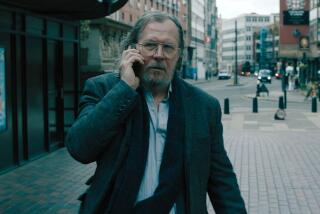Movie review: ‘Tinker Tailor Soldier Spy’
- Share via
The question at the heart of “Tinker Tailor Soldier Spy” is simplicity itself: Is there a Soviet secret agent at the very highest echelons of British intelligence? Getting to the answer, however, couldn’t be more deliciously, thrillingly, brilliantly complex.
Starring a surprising Gary Oldman and masterfully directed by Tomas Alfredson, “Tinker Tailor” comes by that complexity honestly, courtesy of the subtle, allusive 1974 John le Carré novel set in a merciless espionage world where trust is an illusion and nothing is remotely what it seems. This is a film to which very close attention must be paid, but the rewards of doing so are considerable.
That’s because Swedish director Alfredson, who created a stir with his vampire-themed “Let the Right One In,” has come up with a film that is endlessly rich in incident, atmosphere and personality, a film that leaves us hanging on by the barest skin of our teeth as we try to figure out who is doing what to whom and why. The spy trade doesn’t get much more exciting than this.
Alfredson has accomplished all this in the face of considerable obstacles. Not only is Le Carré’s book anything but straightforward, but it’s already been made into a six-hour British miniseries starring an impeccable Alec Guinness as inscrutable protagonist George Smiley, a performance so potent that readers of what became a Cold War trilogy inevitably had the actor in their minds.
Screenwriters Bridget O’Connor & Peter Straughan were equal to the first part of the challenge, artfully compressing Le Carré’s story — the novelist compared it to turning a cow into a bouillon cube — while understanding that in this world what is unspoken is as important as what is said.
Alfredson, for his part, has seen to it that “Tinker Tailor” moves along at a fast-paced, almost electrifying clip. Blessed with a superb ensemble cast, he displays a gift for authenticity and honesty in performance plus an almost uncanny feeling for atmosphere and mood, for letting the pitiless, almost Scandinavian gloom of this tawdry, amoral universe seep into its physical objects. As the gifted cinematographer Hoyte van Hoytema, an artist with the film’s drab, faded grays and browns, told American Cinematographer magazine, “It is a melancholic world set in small rooms, drenched in nicotine and bureaucratic sweat.”
Placing Oldman in the center of this universe was not an obvious choice, but it has played out superbly. For though George Smiley has, in Le Carré’s words, an espionage past “so complex that even he himself could not remember all the enemies he might have made,” he is thoroughly lackluster in appearance, “one of London’s meek who do not inherit the earth.”
Given that, as he himself says, Oldman is “often asked to play kinetic, frenetic characters,” he was “thrilled to be asked to play someone still.” He threw himself into the Smiley role, for instance reportedly trying on 50 pairs of vintage eyeglasses at Old Focals in Pasadena before selecting just the right pair.
Oldman’s Smiley, so correct he even swims with those glasses on, is a man who by all appearances is tired, colorless and defeated, the drab epitome of the unthreatening drone with an unreliable wife thrown into the bargain. But in his methodical and imperturbable way, Smiley is a master at his game, someone you underestimate at your peril, and Oldman’s quietly commanding performance fully understands the power inherent in restraint.
It’s not Smiley we meet first in 1973’s London but his superior, Control (John Hurt at his best), who opens his door in the dead of night to top operative Jim Prideaux (Mark Strong). “You weren’t followed?” are the first anxious words he says, and the game is at once afoot.
Control sends Prideaux to Hungary (changed from the book’s Czechoslovakia) to meet with a general who is thinking of defecting. The general claims to know the name of a double agent or mole the Soviets have placed at the top level of British intelligence, called the Circus by insiders, and Control very much wants that information.
Like everything else in “Tinker Tailor,” that trip does not go as planned, and both Control and Smiley, who is his number two, are forced out of the Circus and into early retirement. With its savage bureaucratic infighting and bitter turf battles, the Circus was hardly Eden, but it is the only world Smiley has known.
Then, unexpectedly, senior government official Oliver Lacon (Simon McBurney) calls Smiley back into the game. Lacon confirms what Control suspected: The mole exists. But who is he, and how does he operate?
Aided by the younger Peter Guillam (Benedict Cumberbatch), Smiley is given the almost impossible task of deciding which of the main suspects identified by Control, who gave the men the nursery rhyme nicknames that give the novel its title, is the Soviet mole.
Was it Percy Alleline (Toby Jones), a.k.a. Tinker, the new head of the Circus? Bill Haydon (Colin Firth), a.k.a. Tailor, who replaced Smiley? Roy Bland (Ciarán Hinds), a.k.a. Soldier? Or someone else entirely. Whoever it is, Smiley knows that the implacable hand of Karla, Moscow’s preeminent spy master, is likely behind it all.
Complex as this may sound, it is only the merest outline of the beginning of perhaps the great spy tale of our time. To see a novel of this level of quality getting the writing, directing and acting it deserves is beyond heartening. “Tinker Tailor Soldier Spy” is an enormously impressive piece of work, and that’s news too good to stay secret for long.
‘Tinker Tailor Soldier Spy’
MPAA rating: R, for violence, some sexuality/nudity and language
Running time: 2 hours, 8 minutes
Playing: At ArcLight, Hollywood; Landmark, West Los Angeles
More to Read
The biggest entertainment stories
Get our big stories about Hollywood, film, television, music, arts, culture and more right in your inbox as soon as they publish.
You may occasionally receive promotional content from the Los Angeles Times.











